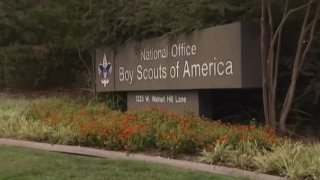
The judge presiding over the Boy Scouts of America bankruptcy issued a ruling Tuesday removing a former Delaware bankruptcy judge as a mediator, saying a court filing by the Boy Scouts raised questions about his impartiality.
Judge Laura Selber Silverstein removed Kevin Carey as one of the mediators tasked with trying to help opposing parties in the case resolve various disputes and reach settlement agreements.
"Mr. Carey is no longer a mediator," Silverstein said during a brief online hearing, noting that she had even considered terminating the mediation process entirely.
The removal of Carey, who retired as a judge in 2019, leaves only one of the three mediators who had been appointed by the judge last year. Another mediator, Paul Finn, resigned three weeks ago. Finn told The Associated Press afterward that he resigned because of "philosophical differences that have existed for some time with other parties and can no longer be reconciled."
Get top local stories in DFW delivered to you every morning. Sign up for NBC DFW's News Headlines newsletter.
Silverstein said she was forced to act against Carey after the Boy Scouts named him in a court filing as the initial "special reviewer" who would assist the trustee overseeing a proposed fund to compensate victims of child sexual abuse.
"That is a nonstarter," the judge said.
"To put it simply, Mr. Carey now has a stake in the outcome of the mediation," Silverstein explained. "…. I believe there is a reason to question his impartiality."
Carey declined to comment.
Local
The latest news from around North Texas.
Under the Boy Scouts' reorganization plan, the appointment of the special reviewer requires the approval of a group called the Coalition of Abused Scouts for Justice, which is a leading supporter of the plan. The coalition represents almost 18,000 abuse claimants and is affiliated with more than two dozen law firms that collectively represent more than 60,000 claimants. The group has played a dominant role in the bankruptcy despite the existence of an official committee charged with representing the best interests of all 82,000-odd abuse claimants. The coalition also has been at the center of various disputes over information sharing and how the BSA's reorganization plan and trust distribution procedures were crafted.
The Boy Scouts, based in Irving, sought bankruptcy protection in February 2020, seeking to halt hundreds of individual lawsuits and create a fund for men who say they were sexually abused as children. Although the organization was facing 275 lawsuits at the time, it's now facing more than 82,000 sexual abuse claims in the bankruptcy.
The plan calls for the Boys Scouts and its roughly 250 local councils to contribute up to $820 million in cash and property into a fund for abuse claimants. They also would assign certain insurance rights to the fund. In return, the local councils and national organization would be released from further liability for sexual abuse claims.
The plan also includes settlement agreements involving one of the Boy Scouts' major insurers, The Hartford, and its former largest troop sponsor, the Church of Jesus Christ of Latter-day Saints, commonly known as the Mormon church. The Hartford has agreed to pay $787 million into the fund for abuse claimants, and the Mormons have agreed to contribute $250 million. In exchange, both entities would be released from any further liability involving child sex abuse claims.
Silverstein on Monday agreed to extend the Dec. 14 plan voting deadline by two weeks. The extension comes amid concerns by some attorneys, and the judge herself, that an email and letter distributed last month by attorneys for the official committee representing abuse claimants may have caused confusion and tainted the voting process. BSA attorneys also have suggested that an extension would allow more time to try to negotiate additional settlements.
Meanwhile, BSA attorney Jessica Lauria told Silverstein last week that only 4,300 abuse claimants had voted as of Nov. 24.
The email and letter that prompted concerns about the voting process were sent on behalf of attorney Tim Kosnoff, a vehement opponent of the plan who is urging his clients to vote against it. The problem is that Kosnoff shares those clients with two other law firms, one of which is adamantly urging those same clients to vote for the plan.
Attorneys for the official committee, which also opposes the BSA plan as "grossly unfair," sent Kosnoff's email and letter to some 12,900 abuse claimants for whom he serves as co-counsel, but mistakenly added more than 7,500 other recipients, including other law firms and claimants represented by other attorneys.
Attorneys for the Boy Scouts and the coalition claim that the email and letter have created confusion among abuse claimants and disrupted the voting process. They also contend that committee attorneys acted deliberately.



